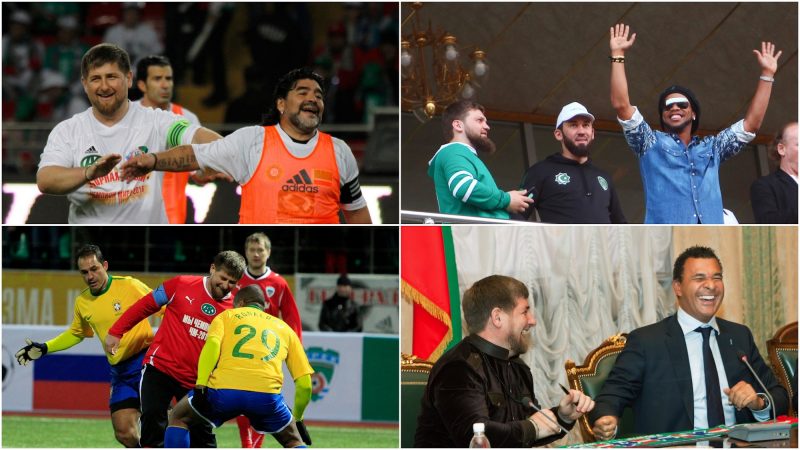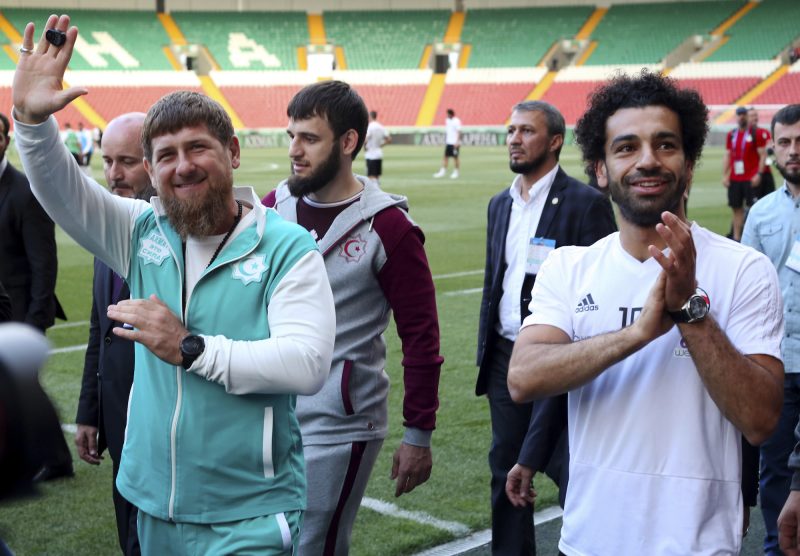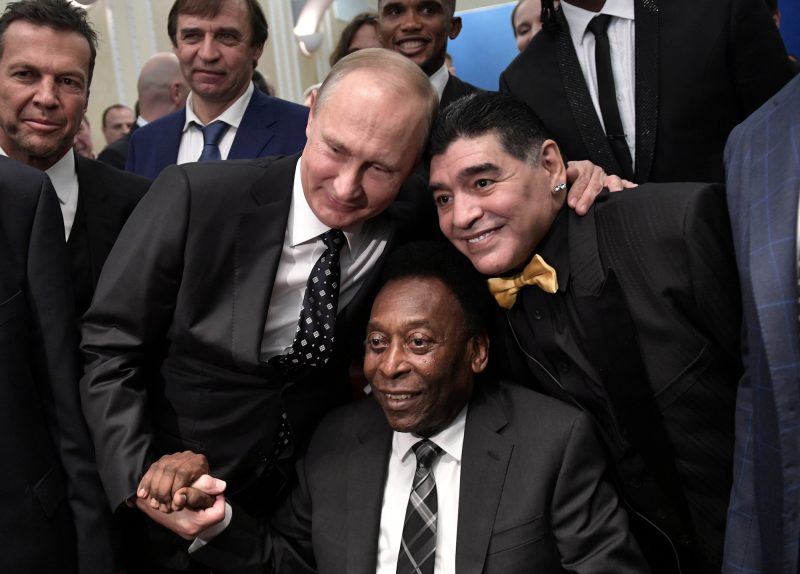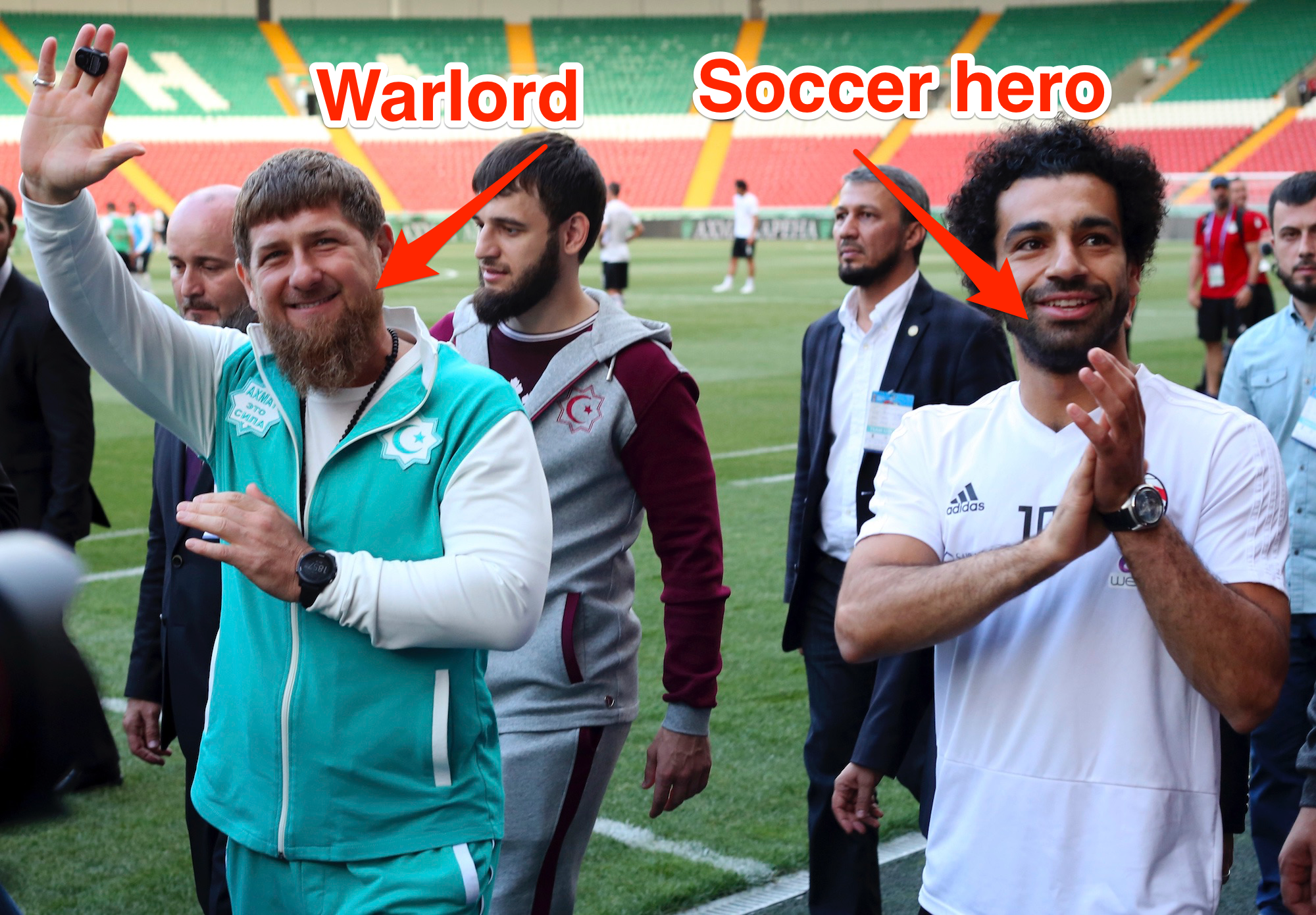- The World Cup is an event that brings together millions of people across the planet, and a lot of kudos to its hosts.
- But in 2018 the tournament is in Russia, a country with extremely serious problems.
- Russian leaders, including Putin and Chechen warlord Ramzan Kadyrov, have been basking in the publicity and burnishing their image.
- Photos of soccer heroes standing next to Russia’s elite are a clear symbol of how the sporting event is being turned to political ends.
If you stand accused of involvement in torture, kidnapping, and murder, one thing is clear – you have a public image problem. So what do you do?
For Ramzan Kadyrov, head of the Chechen Republic in Russia, one solution is to pose for photos with Mohammed Salah, one of the best soccer players on the planet, who has come to Russia to compete in the 2018 World Cup.
Kadyrov, widely described in Western media as a warlord, used to burnish his public image by posting photographs of himself cuddling cats, but he’s since had his profiles taken down by Facebook and Instagram.
Priceless… Chechen leader Kadyrov turns to Instagram to find lost cat https://t.co/fxjG1xc3bA #Chechnya #socmedia pic.twitter.com/j4xOYqi6eb
— Onnik J. Krikorian (@onewmphoto) May 21, 2016
The platforms have never explained exactly why he was banned, but it coincided with international outrage over the apparent attempts by his government to purge Chechnya of all gay people.
Taking a photograph with Salah is a propaganda coup for Kadyrov, enabled by the mechanics of a Russian-run World Cup which put one of the most-loved stars of the game on his doorstep.
What is Egypt's team doing in Chechnya?
Egypt setting up camp in Grozny, Chechnya's capital, makes sense in some ways. There is halal food, access to the Akhmad Kadyrov Mosque - one of the largest in Russia, and the team is staying in a luxury hotel where bi-lingual staff speak Arabic and English.
But it is also a dark place under Kadyrov's leadership. According to Human Rights Watch, his regime oversees enforced disappearances and extrajudicial killings. There is also a "near-total repression of critics, journalists, and LGBT people."
A gay man who fled Chechnya told BBC under anonymity last year that he was beaten and subjected to electro-torture. He said his home country had been "exterminating gay men" until "there are none left in the republic."
He said: "Chechens have no right to be gay. They have to be warriors, straight, sportsmen. Being gay is just not acceptable for them."

Kadyrov met the team last Sunday at a public training session in front of 8,000 fans, and the world's media.
There was one notable absentee, though - Mohamed Salah, a forward who rivals soccer legends like Lionel Messi. In his last season, Salah scored 43 goals for Liverpool FC, and in the process became a sporting hero for many.
He is still recovering from an injury in his last game, and so at the Kadyrov training session he was asleep, in his hotel room, instead of on the field.
The New York Times says Kadrov sent a henchman and a vehicle to rouse Salah from his sleep and chaperone him to the Grozny Stadium.
Kadyrov, not to be outdone by Salah's inconvenient injury, needed his photograph. Here it is.

The World Cup is usually a story of bringing countries and fans together. It turns athletes into heroes and can create superstars from a single moment.
But this narrative is at obvious odds with Kadyrov's Chechnya as it stands. Good PR moments like his shot with Salah are part of an attempt to reverse this.
On hosting Egypt in Grozny, Jambulat Umarov, Chechnya's minister of national policy, press, and information, is quoted by the New York Times to have said: "It's all about a positive image of the Chechen Republic. It's about dispelling myths."
Putin is doing the same thing

Putin has been following a similar playbook. The Russian president recently listed Brazil's all-time leading goalscorer Pelé and former Argentina playmaker Maradona among his favourite soccer players.
He met both former World Cup winners at the official draw for the 2018 FIFA World Cup, last year.
But these photo opportunities mask the inclusive nature of sport, of soccer, and of its most prestigious event - the World Cup.
The World Cup is helping to turn the narrative around Putin, following years in the cold on the world stage.
Only a few months ago, most of the western world pulled diplomats from Russia over the assassination attempt on former spy Sergei Skripal in England.
International investigators recently said a Russian missile launcher was behind the shooting down of flight MH17 over Ukraine, and Putin continues to receive criticism for the 2014 annexation of Crimea.
But an event of the magnitude of the World Cup, are an enormous distraction from that, and a chance for leaders like Putin and Kadyrov to preside over a huge global event and rack up kudos.
The images from the build-up will only be the beginning. Like with the 2014 Winter Olympics in Sochi, Putin will have amassed more proof that Russia can host the world as well as anybody.
Meanwhile, the many things which make Russia nothing like much of the rest of the world remain forgotten.

